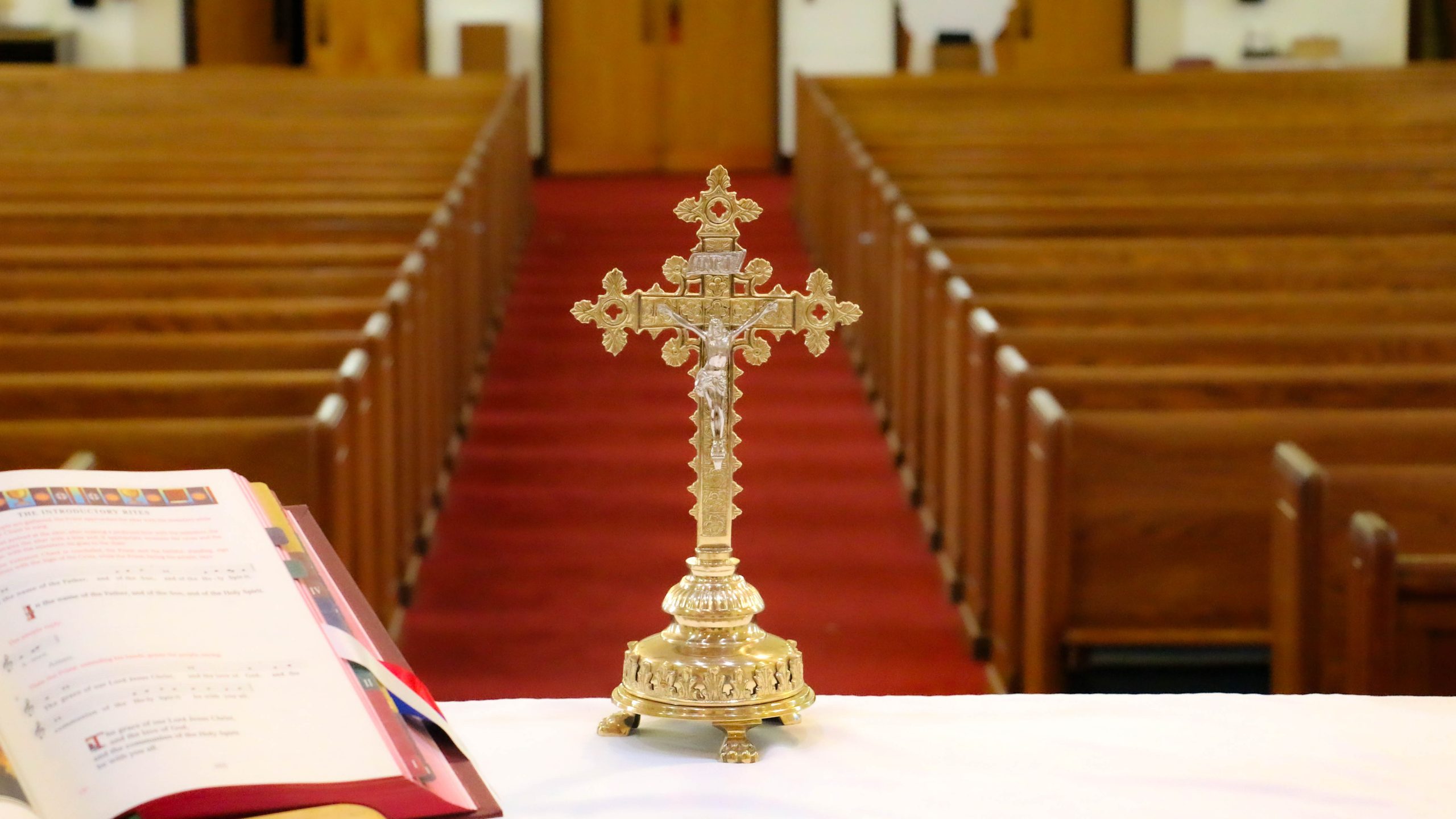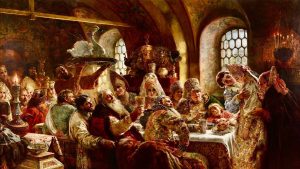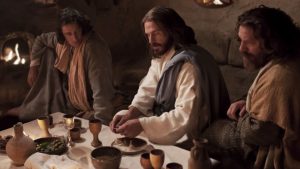Welcome, brothers and sisters, to our Second Sunday of Lent! Every single second Sunday of Lent, we receive the Gospel about the Transfiguration. Last week, we heard that Jesus was pulled or even pushed into the desert after receiving baptism. Now, as he’s being tested by the devil, he’s put into the context of his mission. Today, we hear about the episode of the Transfiguration.
Throughout Jesus’s public life, his divinity was shrouded, covered, while his humanity was visible through his actions—healing, deliverance, multiplying the loaves, and even raising the dead. Everybody was questioning and asking, “Who is this man? Is he only a prophet? Is he only an important messenger or a seer?” Ultimately, we reach a point of knowing that he is the Son of God.
In the context of the Transfiguration, when he’s changing in form, perceived as someone from another world, this event was critical for the disciples. They were walking towards Jerusalem, where they would see Jesus disfigured. Here, they see him transfigured. Shortly after, they will see him scourged, full of wounds, ultimately crucified and dying on the cross. So how do we make the connection between those two figures? Was the first one the real one or the latter one? How do you make sense of the one who got transfigured, who had performed all the miracles? That’s the critical element of the Transfiguration—the disciples needed this time of God’s glory shining from Jesus, who got transfigured. They needed those powerful lights that are being sent from God so that later on, when the time of trial arrives, they may remain.
In our lives, if we lack those lights of God’s glory, brothers and sisters, we are not going to remain in faith. Basically, if we have nothing to fall back on in our lives where Jesus Christ made himself visible in a clear way, an obvious way, sooner or later, we will drift away. There’s no way you can remain. You will be there because what will happen is called the scandal of the cross. God sends events like that. I’ve seen it in my personal life and talking to a lot of different people. I find out that God sends an event—maybe a retreat, maybe a pilgrimage. I recall a lady telling me, “It was incredible. When I went to the Holy Land on a pilgrimage, I was so filled with the Spirit. As soon as I came back home, a major trial with my family arose, and I understood God was fortifying me in faith so that I could face what was coming.” And only the fact that I had received so many graces in that pilgrimage, I was able to stand firm and trust. Otherwise, it’s very easy to fall away. You can’t imagine the amount of conversations I’ve had with people who drifted away, fell away, turned atheist or whatever because of the cross, because of the tribulation. But one of the reasons why they fell away is because they lack the experiences of Christ earlier on. So as soon as the darkness came upon them, there’s a panic right there. There’s a fear, panic, disbelief, doubt. And ultimately, the devil comes and says, “Say God does not exist.”
The memory of the powerful experiences of God, they allow us to last and to go through the times of darkness. That although we may not sense the presence of God right away, we know he’s there. Why? Because you can look back and say, “He was in that event, this event over here, and over there. And the Lord is there, even though the sky is clouded, but the sun is still there. But if we don’t even know that the sun is out there and we see only the clouds, then it’s easy to throw in the towel, saying, ‘I quit.'” Faith of a Christian is the one that is based on this concrete fact that God made himself present in our lives, and that allows us to go through the time of darkness.
The lights God sends our way, and the evil one is very shrewd and sly to erase those memories, saying, “You’re pretty much alone. Nothing is up there, above you. You’re just thrown out into this total drama of life and just handle it.” God never said that. But now, the critical thing is to know where he manifests himself and how he makes himself known to us.
The second understanding or meaning of this Transfiguration is the anticipation of what is to come, basically, the resurrection. What’s ahead? Oftentimes, the disciples heard the prediction of the passion, death, and resurrection, but their ears were turning deaf when the word “resurrection” was coming. They only heard the first part, the second, almost like inaudibly, is just gone. Because this is what we are used to. There is a passion and death period. Finish, the end. And the Lord says, “No, the last word belongs to the resurrection.” And even though soon after, they will see him crucified and dying an atrocious death on the cross as a criminal, everybody could have said, “That’s the end.” And yet, he surprised us all. No one came out of the tomb. Christ himself, he’s the resurrection. He’s the first fruits of those who were risen. And for the life of a Christian, the fact that the last word belongs to the resurrection, given he’s raised with Christ interiorly from sin, makes all the difference.
I mean, look at it even from this perspective. When an athlete trains for a contest, maybe for the Olympics, I was reading an article about one of the athletes, all this effort and very strenuous training. It’s not like they start training two days before the competitions. They train hard. Why? Because what’s up there, which is a golden medal, everybody’s shooting up there. Even though there are other great athletes competing, but he knows that all the effort is leading up to the competitions. Or, for example, why would a student spend hours studying hard? Not for the sake of studying, but he knows that he will pass an exam and ultimately graduate, right? So you see, the immediate effort and painful condition, but the ultimate goal is glorious.
And for a Christian, that’s exactly this. The ultimate goal is glorious. And it’s so critical not to forget about it. But for that ultimate goal to be glorification, this transfiguration, which exactly means changing the form, there needs to be our transfiguration. Christ gets transfigured, changing the form so that we can be changed as well. We can make a move, a change, not on our own, not with our own strength, but thanks to what he’s providing. So, for example, being transfigured from disbelief to faith, that’s a huge leap. Another one, passing from fear to confidence and courage. Or being transfigured from a person who complains to the one who is grateful, or the one who hates towards the one who forgives. You know how critical those transfigurations are. And oftentimes, it takes a long time to be transfigured, to have a change of what is happening.
And St. Paul says, “Look, if God is already on your side, how would he not give everything along with Jesus Christ who has died for you? How much more he would give, a huge volume of blessings.” And if I ask you, everybody would say, “I would like those blessings.” Right, everybody? But there is a little problem. And we find out from the first reading when God puts Abraham to the test. And in that reading, you can see what blocks the flow of blessings and what opens the gates. For me personally, reflecting on this reading gave me an insight into why throughout my life, I’ve seen the lives of many people and families being like almost a total disaster. And I recall conversations when people said, “My life is a curse. It’s a total mess. It’s a disaster. Look here, look there.” Why? And why other people or families thrive and things are flowing? What opens the gates to understand it?
Well, if you look carefully into the first reading in its entirety, you find out that Abraham was promised a child in the land. But we come here in this particular piece we have just read to the moment when Abraham has his son, his beloved Isaac, right in front of him. And the Lord says, not something unusual, when he asks to have Isaac sacrificed. Because back in the day, in the context where they lived, it was pagan nations. They were sacrificing their children. Like today, with abortion, with everything, people, their children, massive amounts of children, sacrificed, which is basically a way to corruption. And so the Lord says, “Sacrifice Isaac for me,” because he became an idol for you. Everything that we put at the center, away from God, will turn into an idol. An idol blocks the flow of blessings. God didn’t want Isaac to be killed. No. But he wanted to test Abraham, and Abraham had to learn what was in his heart.
Abraham could have said, “Forget it. I’m not going to do it. Get out. I already got what I wanted. Now see you never again,” right? This is what many people do. “I got what I wanted. Now I’ll make a phone call whenever I need you.” But Abraham is obedient. And look what happens. In the last moment, God reveals himself, saying, “Stop. Don’t harm Isaac.” And then he looked and saw a ram caught in the thicket. And then comes all this long list of blessings, if you read carefully. So many blessings. And the Lord says, “Because you obeyed my command.” So if you read the phrase the other way around, it would be, “Nothing of this if you disobeyed my command. If you put something else above me, no blessings to you.” And what comes if no blessing occurs? Not because God curses. We put upon our lives horrifying curses, and we call them demons, and they wreck our lives to the bone. God never wants that. What he desires is for us transfiguration, glorification, ultimately resurrection. This is where we are meant to go. And in this process, we are being tested, whether we like it or dislike it. There are many different tests that are coming. When the Lord says, “Look, in this case or in that case, you turned into an idol for yourself, or you made something else give it to me, because it will destroy you.” “No, I don’t want to give it to you.” “Okay, well, you will go through rehab. You will go through a total mess of life, and your future will be closed in front of you.” Sure enough, that happened. Why? Because he never was willing to give up his life to the Lord, to offer it up.
This is how amazing it is, brothers and sisters, that God is calling us to look beyond what is visible to our physical eye. That we can find in the Bible God speaking. We can find in the Eucharist Jesus Christ present. We can find in what’s happening during the season of Lent as a call to conversion and faith. Because what he’s preparing for us is a glory, transfiguration, and happiness that we cannot even put in words. Not by chance St. Peter says, “It is so good to be here.” If this is what he said when he was on the mountain, imagine how great, how immeasurably greater joys God prepares for those who love him, meaning for those who put him first.
Lent serves for our purification. Hard it might be, difficult it can turn, but always for our glory.



